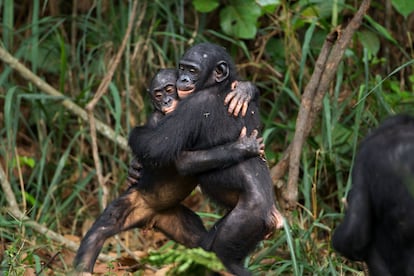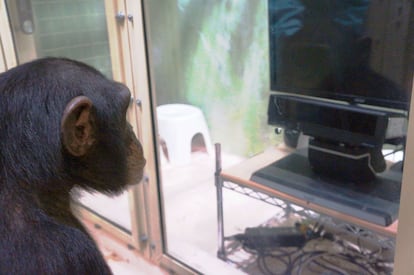Chimpanzees and bonobos remember their friends after decades apart
An experiment shows that humans’ closest evolutionary relatives also have strong social memories

Despite having gone 26 years without seeing her sister Loretta and her nephew Erin, Louise recognized them in the photographs that researchers showed her; she stopped to look at her family. Like Louise, other bonobos and chimpanzees also demonstrated strong social memory. Pioneering work shows that members of both species remembered members of the groups to which they had belonged long ago. Their memory was deeper if the valence of the relationship was positive, that is, if they were friends. According to the study’s authors, this ability, which the animals share with humans, forms the basis of complex societies.
The idea to investigate whether great apes can remember their acquaintances came from the scientists’ own experience of interacting with them. Researchers found that the animals recognized them when they came back to visit them after one, two or five years. To confirm this recognition, a group of primatologists, anthropologists and psychologists designed an experiment in which they showed two images on a screen at the same time. One image showed a former member of the group to which the viewer belonged, but who had left a long time ago (either they died or were transferred to another facility). The other image showed another specimen of the animal’s species who was a complete stranger. The monitor was equipped with a system to detect eye movements. The experiments were conducted with 26 chimpanzees and bonobos from Edinburgh Zoo (U.K.), Planckendael Zoo (Netherlands) and the Kumamoto Sanctuary (Japan). The image passes lasted only three seconds. Josep Call, a primatologist at the University of St. Andrews (U.K.) and a co-author of the paper, explains the short duration: “You put a child in front of a problem and look and look and look. Chimpanzees don’t do it like that. They look to one side, then to the other and back to this side again. Their attention is distributed differently. That’s why you have to give them tests that are brief to capture their attention at that moment.”
According to the study, published in PNAS, both chimpanzees and bonobos spent an average of 0.24 seconds longer looking at images of their former group mates in these tests. And the animals’ memory was long-term. On average, the test subjects had gone five and a half years without seeing those in the images.
“There was no difference between chimpanzees and bonobos,” Call says. Both species are humans’ closest relatives, in terms of evolution. The three lineages diverged between six and nine million years ago, but both chimpanzees and bonobos share 98.7% of their genome with humans.
Recognition is essential in life. It allows us to remember places where there’s plentiful food or a dangerous snake. But it is not only events and places that are remembered. Humans also retain relationships and the emotions associated with them in their memory. In the experiments on chimpanzees and bonobos, researchers found that the great apes also do this: participants from both species in all three countries looked more closely at the group mates with whom they had had positive interactions, which in a human context would be called friendship. Professor Christopher Krupenye of Johns Hopkins University, an expert in animal cognition and a senior author of the study, explains that “this suggests that it’s not just about familiarity with something, but that they retain aspects about the quality of those social relationships.” Previous research has shown that primates who cultivate social bonds reproduce more, implying an evolutionary advantage to friendship.

In the most extreme case, Louise the bonobo remembered her family even though 26 years had gone by, spending more time on them in the eight passes she was given in the experiment. For a species with a life expectancy of 60 years at most, that is a long time, indicating that the strength of relationships does not diminish with age. But the authors cannot say for certain that Louise’s long social memory was the result of kinship and not simply group membership. In the sample, there was only a familial relationship. For that reason, Laura Simone Lewis, a psychologist at the University of California, Berkeley, and the study’s lead author, notes that the researchers didn’t specifically measure how much the animals looked at relatives. “In fact, in the main analyses, we excluded cases of relatives so that kin-recognition mechanisms would not interfere with recognition patterns.” That is one of the lines of research to be pursued in the future: whether family weighs as heavily or even more so than friendship in social memory.
We humans like to think that everything we do is unique, and here we show that it is not.”Josep Call, a primatologist at the University of St Andrews (U.K.)
This study’s results mean that bonobos and chimpanzees are the animals with the longest social memory, making them almost immune to the passage of time. In humans, the so-called forgetting curve is very pronounced in the first 15 years that go by without seeing a loved one, but thereafter the memory remains forever. The fact that all three species share this capacity is a clue to social memory. Call points out that “humans like to think that everything we do is unique and here we show that it is not, that chimpanzees and bonobos do it too.” Other species, like dolphins, are also able to distinguish their group mates’ vocalizations, despite spending time apart. “Once you get to a type of behavior in which individuals are not only part of a group, but are individuals that others can identify as Charlie, Juanito or Pepita, from then on the type of social complexity that is established and that can potentially evolve is much greater,” the primatologist concludes.
Julia Fischer is a primatologist at the German Primate Center. Like the authors of the study, with which she was not involved, she had a similar experience: “I went back to see the baboons I had studied for a year and a half in the Okavango Delta five years later. And oddly enough, the animals I had studied treated me like someone they knew (ignoring me), while the new ones who had been born since my departure or who had immigrated to the group, treated me like a stranger.” While this is an anecdote, it also indicates the maintenance of social memory. As Fischer summarizes, “Recognizing the members of your group has a clear survival value and, of course, it is also necessary to have a good memory, as we do, as a precondition for human friendship and drama.”
Sign up for our weekly newsletter to get more English-language news coverage from EL PAÍS USA Edition
Tu suscripción se está usando en otro dispositivo
¿Quieres añadir otro usuario a tu suscripción?
Si continúas leyendo en este dispositivo, no se podrá leer en el otro.
FlechaTu suscripción se está usando en otro dispositivo y solo puedes acceder a EL PAÍS desde un dispositivo a la vez.
Si quieres compartir tu cuenta, cambia tu suscripción a la modalidad Premium, así podrás añadir otro usuario. Cada uno accederá con su propia cuenta de email, lo que os permitirá personalizar vuestra experiencia en EL PAÍS.
¿Tienes una suscripción de empresa? Accede aquí para contratar más cuentas.
En el caso de no saber quién está usando tu cuenta, te recomendamos cambiar tu contraseña aquí.
Si decides continuar compartiendo tu cuenta, este mensaje se mostrará en tu dispositivo y en el de la otra persona que está usando tu cuenta de forma indefinida, afectando a tu experiencia de lectura. Puedes consultar aquí los términos y condiciones de la suscripción digital.









































